High-ranking delegation from Cabo Verde visits the Kieler Woche
Visit of Prime Minister and Minister of the Sea strengthens cooperation with GEOMAR
For almost 20 years, GEOMAR Helmholtz Centre for Ocean Research Kiel has been closely cooperating with research and educational institutions in the Republic of Cabo Verde. A lively exchange with politics and society in the region has also been established. The visit of a high-ranking delegation to this year's Kieler Woche further strengthens these ties: Prime Minister José Correia e Silva will open the festival on 17 June 2023 on the town hall stage together with other prominent guests. He will be accompanied by the Minister of Culture, Creative Industries and the Sea, Abraão Vicente, the Ambassador of Cabo Verde to Germany, Emanuel Duarte, the President of the Instituto do Mar (IMAR), Albertino Martins, and the Coordinator of the Ocean Science Centre Mindelo (OSCM), Ivanice Monteiro. During two visits to GEOMAR and further meetings, aspects of future joint research will be discussed.
“The Kieler Woche stands for a vibrant international exchange – in sailing as well as in culture and science. Cooperations with professional and non-professional crews that provide us with important measurement data also show how closely sailing and marine research are connected,” emphasises Professor Dr. Katja Matthes, Director of GEOMAR. “We are very honoured that our Cape Verdean partners use the Kieler Woche as an opportunity to continue our dialogue. We are following up on fruitful discussions during our visit to Cabo Verde in January and are grateful to now be able to present GEOMAR on site in Kiel and to set a common course for an even closer cooperation."
The Cabo Verde islands are located off the coast of West Africa in the tropical Atlantic Ocean – and thus at the centre of one of our most important life support systems. In the archipelago, it becomes visible how the ocean influences our climate, feeds us and secures livelihoods – and how it is already impacted by climate change. The coastal upwelling system near Cabo Verde is one of the most biologically productive and species-rich regions of the world ocean. It is of highest ecological and socio-economic importance and therefore also at the focus of research at GEOMAR.
Together with the Instituto do Mar (IMar) and with the support of the German Federal Ministry of Education and Research (Bundesministerium für Bildung und Forschung, BMBF), GEOMAR founded the Ocean Science Centre Mindelo (OSCM) on the Cabo Verde island of São Vicente in 2017. The centre serves as a base for field research in the tropical northeast Atlantic, scientific exchange as well as university education and networking with West Africa. In addition, internationally important long-term stations for ocean and atmospheric research have been operated in the region since 2006. Other German partners involved include the Leibniz Institute for Tropospheric Research (TROPOS) in Leipzig and the Max Planck Institute for Biogeochemistry in Jena, as well as various universities. Since 2019, the BMBF has been funding the international Master's programme “Climate Change and Marine Sciences” at the Universidade Técnica do Atlantico (UTA) for students from West Africa in Mindelo as part of the West African Science Service Centre on Climate Change and Adapted Land Use (WASCAL).
“Building on the joint scientific achievements and the joint mission of IMar and GEOMAR, we would like to further strengthen the OSCM for sustainable operation. Previous projects prove the enormous potential of the region – and in the combination of infrastructure and promotion of young scientists, we can jointly harness opportunities for development,” Professor Matthes emphasises. “At the same time, this would also create an important basis for future large-scale research campaigns.”
Starting in 2027, a large-scale international research project led by GEOMAR will put a special focus on the region off West Africa: The Future of Tropical Upwelling Regions in the Atlantic Ocean (FUTURO) will investigate how the natural upwelling system off West Africa, which is eminently important for West Africa's population, will develop in a changing climate and how this biologically particularly productive and biodiverse region can be protected and sustainably managed.
“Coastal upwelling systems such as the one off West Africa account for less than one per cent of the ocean, yet they provide five per cent of the biological productivity and twenty per cent of the fisheries yield of the entire ocean. At the same time, they are threatened in many ways by global change,” explains Professor Dr Arne Körtzinger, Scientific Director of OSCM and coordinator of FUTURO. “In view of this huge importance and expected changes, the international large-scale experiment FUTURO aims to provide the necessary understanding of the system and a basis for sustainable use and protection of the coastal upwelling system. At the core of this experiment is a concerted deployment of several international research vessels and a variety of autonomous observation platforms.”

During their visit, the delegation got informed about the work and infrastructure of GEOMAR. From left: IMar President Albertino Martins, Cordula Zenk, Cabo Verde Coordinator at GEOMAR, Emanuel Duarte, Ambassador of the Republic of Cabo Verde to Germany, Professor Dr. Arne Körtzinger, Scientific Director of OSCM, Minister of the Sea Abraão Vicente, GEOMAR Director Professor Dr. Katja Matthes, Guido Wendt, State Secretary in the Schleswig-Holstein Ministry of Education, Science, Research and Culture, Frank Spiekermann, Administrative Director of GEOMAR. Photo: Maike Nicolai, GEOMAR

During their visit, the delegation from the Republic of Cabo Verde also gained an insight into the new GEOMAR building at the Seefischmarkt. Photo: Maike Nicolai
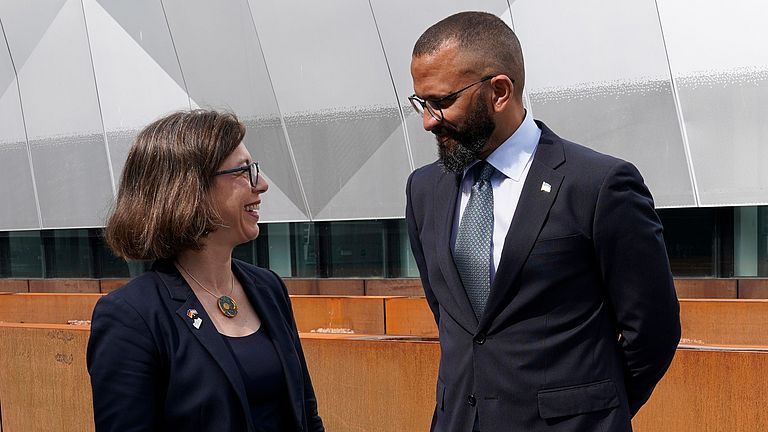
GEOMAR Director Professor Dr. Katja Matthes and the Minister of the Sea Abraão Vicente during th tour of the new GEOMAR building. Photo: Maike Nicolai

Professor Dr. Arne Körtzinger presented the planned research project FUTURO. Photo: Maike Nicolai, GEOMAR

Dr. Peter Linke, Head of the Technology and Logistics Centre presented some of GEOMAR's large research equipment. Photo: Maike Nicolai, GEOMAR
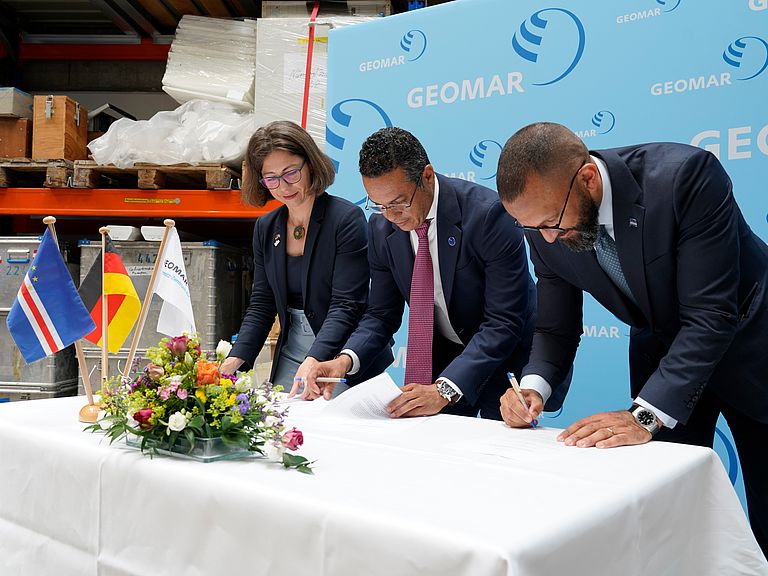
Signing of an agreement for the joint further development of the Ocean Science Centre Mindelo. From left to right: GEOMAR Director Professor Dr. Katja Matthes, IMar President Albertino Martins and the Minister of the Sea Abraão Vicente. Photo: Maike Nicolai, GEOMAR

GEOMAR Director Professor Dr. Katja Matthes informs Prime Minister José Correia e Silva about GEOMAR's research. Photo: Maike Nicolai, GEOMAR
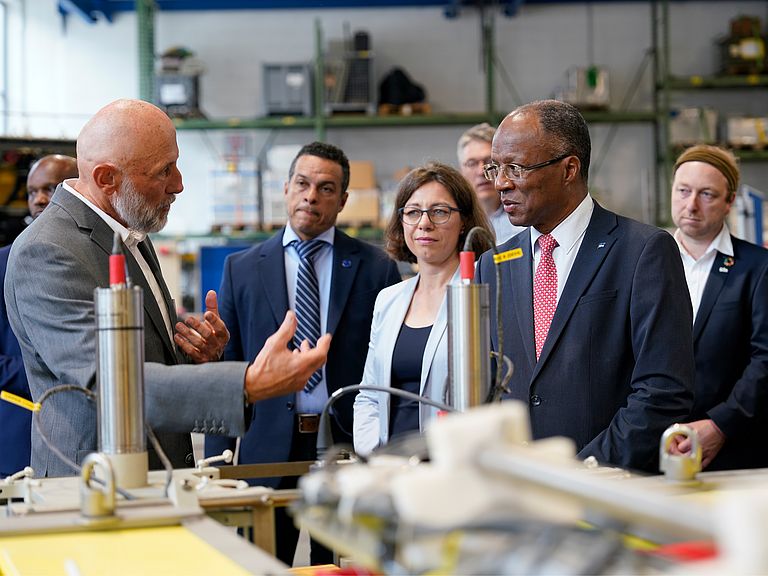
Dr. Peter Linke, Leiter des Technik- und Logistik-Zentrums stellt Premierminister José Correia e Silva die Infrastruktur des GEOMAR vor. Foto: Maike Nicolai, GEOMAR

The two seafloor crawlers VIATOR and PANTA RHEI could also be visited in the Technology and Logistics Centre. Photo: Maike Nicolai, GEOMAR
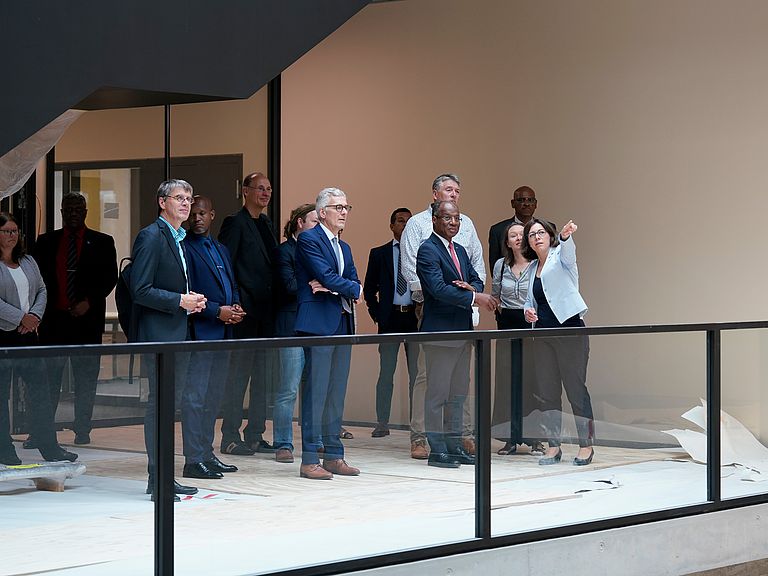
Tour of the new GEOMAR building with the Prime Minister of Cape Verde, José Correia e Silva. Photo: Maike Nicolai, GEOMAR
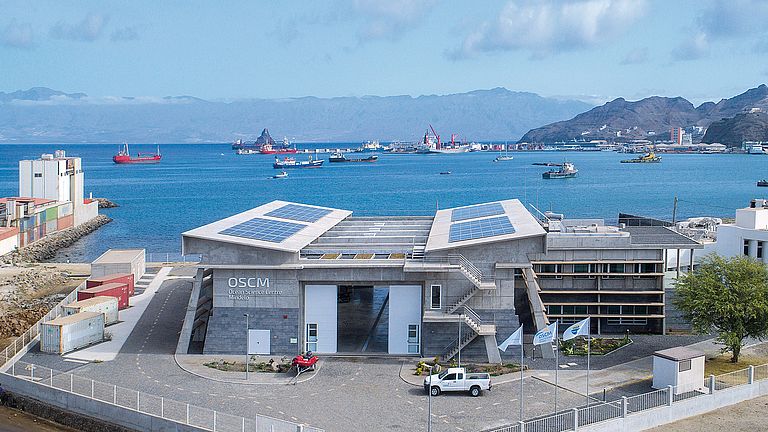
The Ocean Science Centre Mindelo. Photo: Edson Silva Delgado
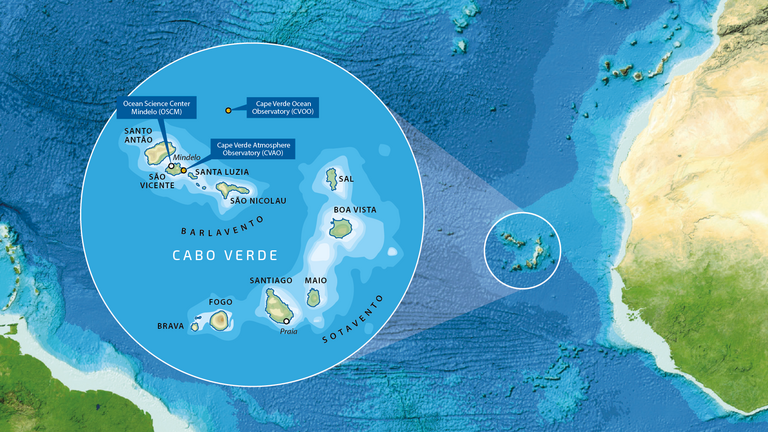
The Cape Verde Islands are located 1,500 kilometers southwest of the Canary Islands and about 600 kilometers west of the coast of Senegal. Graphic C. Kersten/GEOMAR, Map: GEBCO


